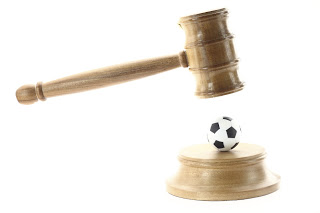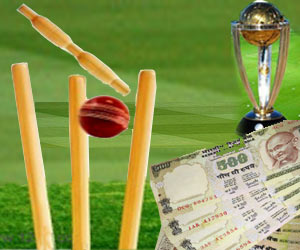Red Card: Need for a Comprehensive Sports Legislation in India
India has provided the world with fourth largest
football spectacle, in terms of average attendance, known as the Indian Super
League as well as the biggest annual T-20 tournament the Indian Premier League.
In addition to the prior mentioned sporting events, similar sporting events
involving Tennis, Hockey, Badminton and Kabaddi have been initiated in India,
with reasonable success. Hence a reasonable conclusion can be drawn that the
field of sports in India has undergone a sea of change and shall continue to do
so in the coming years. Sports is a field as such with the ability to draw
emotion among the masses. It has the ability to unite as well as divide
individuals across all age groups. Basically India as a country has finally
started recognizing and appreciating the appeal of sports.
football spectacle, in terms of average attendance, known as the Indian Super
League as well as the biggest annual T-20 tournament the Indian Premier League.
In addition to the prior mentioned sporting events, similar sporting events
involving Tennis, Hockey, Badminton and Kabaddi have been initiated in India,
with reasonable success. Hence a reasonable conclusion can be drawn that the
field of sports in India has undergone a sea of change and shall continue to do
so in the coming years. Sports is a field as such with the ability to draw
emotion among the masses. It has the ability to unite as well as divide
individuals across all age groups. Basically India as a country has finally
started recognizing and appreciating the appeal of sports.
This new found love and rapid development in the
field of sports has lead to the recognition of the fact that India lacks a
comprehensive statutory body to govern and regulate the numerous disputes that
may arise in due course of a sport.
field of sports has lead to the recognition of the fact that India lacks a
comprehensive statutory body to govern and regulate the numerous disputes that
may arise in due course of a sport.
The need for a well thought sports legislation has
never been more imperative. The vast domain of sports law covers aspects ranging
from labour, contract, competition, anti-trust, tort and issues pertaining to
defamation and privacy rights.
never been more imperative. The vast domain of sports law covers aspects ranging
from labour, contract, competition, anti-trust, tort and issues pertaining to
defamation and privacy rights.
Worldwide
the field of sports law was established as a separate and important entity only
a few decades ago, coinciding with the rise of player-agents and increased
media scrutiny of sports law topics.
the field of sports law was established as a separate and important entity only
a few decades ago, coinciding with the rise of player-agents and increased
media scrutiny of sports law topics.
Sports
law can be roughly categorized into Amateur, Professional and International
sports. Of the prior mentioned fields with respect to India only Professional
and International sports are of major concern, primarily down to the factor
that India lacks a proper and substantive Amateur sports setup.
law can be roughly categorized into Amateur, Professional and International
sports. Of the prior mentioned fields with respect to India only Professional
and International sports are of major concern, primarily down to the factor
that India lacks a proper and substantive Amateur sports setup.
The
Indian legislature post 2013 has taken rapid measures to enact a law governing
the field of sports. Hence the proposed draft bill titled National Sports
Development Bill, 2013 is a work in progress. The Bill does not seek to
transgress upon the existing status of the National Sports Federations as well
as the National Olympic Committee. The primary object of the bill is to lay
emphasis upon the globally accepted practices of good governance in the Indian
scenario.
Indian legislature post 2013 has taken rapid measures to enact a law governing
the field of sports. Hence the proposed draft bill titled National Sports
Development Bill, 2013 is a work in progress. The Bill does not seek to
transgress upon the existing status of the National Sports Federations as well
as the National Olympic Committee. The primary object of the bill is to lay
emphasis upon the globally accepted practices of good governance in the Indian
scenario.
Instances
of malpractices such as doping, match fixing, betting and the IPL controversy
involving Mr. Lalit Modi has embarrassed the nation on a global scale to such
an extent where such a piece of legislative action is urgently required.
Corruption is a phenomena previously unassociated with the field of sports. Hence
the general direction in which sports is being conducted in India is sufficient
grounds to cause worry among the lawmakers. In India the mixture of individuals
looking to earn a quick buck rather than earn an honest days living has
increased the levels of corruption to such an extent where it no longer is
amusing. Sad fact about India is that such individuals are the ones who are
tasked with responsibility of running the numerous sports administrative
agencies. The deadly concoction of politicians and such individuals results in
a haphazard administrative state of Indian Sports bodies. The whole saga
involving Mr. K.P. S Gill drives home my point. We had a retired public
servant, who was into anti-terror operations during his days, was inexplicably
tasked with managing the Indian Hockey Federation for well over two decades. A
person with no connection to the field of Hockey is made the top dog, end
result Hockey is a dying sport. Inspite of the game being the national sport of
the country, which again many people aren’t aware off, such a sorry state of
affairs involving the national sport, makes me question the state of numerous
other sports authorities.
of malpractices such as doping, match fixing, betting and the IPL controversy
involving Mr. Lalit Modi has embarrassed the nation on a global scale to such
an extent where such a piece of legislative action is urgently required.
Corruption is a phenomena previously unassociated with the field of sports. Hence
the general direction in which sports is being conducted in India is sufficient
grounds to cause worry among the lawmakers. In India the mixture of individuals
looking to earn a quick buck rather than earn an honest days living has
increased the levels of corruption to such an extent where it no longer is
amusing. Sad fact about India is that such individuals are the ones who are
tasked with responsibility of running the numerous sports administrative
agencies. The deadly concoction of politicians and such individuals results in
a haphazard administrative state of Indian Sports bodies. The whole saga
involving Mr. K.P. S Gill drives home my point. We had a retired public
servant, who was into anti-terror operations during his days, was inexplicably
tasked with managing the Indian Hockey Federation for well over two decades. A
person with no connection to the field of Hockey is made the top dog, end
result Hockey is a dying sport. Inspite of the game being the national sport of
the country, which again many people aren’t aware off, such a sorry state of
affairs involving the national sport, makes me question the state of numerous
other sports authorities.
The international protocols and
norms of sports do not recognize limitless and undue governmental control and
governance, as is the case in India, in the form of laws, rules and
regulations, especially because the self-regulated bodies of sports have more
or less their own internal dispute resolution mechanisms. In fact, the Indian
government has had proposed to legislate sports law so as to regulate the
internationally representative field of competition.[1]
norms of sports do not recognize limitless and undue governmental control and
governance, as is the case in India, in the form of laws, rules and
regulations, especially because the self-regulated bodies of sports have more
or less their own internal dispute resolution mechanisms. In fact, the Indian
government has had proposed to legislate sports law so as to regulate the
internationally representative field of competition.[1]
International sporting authorities,
to name a few WADA, UEFA, FIFA, IOC etc, all have an established internal
system of dispute resolution. Of which appeal lies directly with the Court of
Arbitration for Sports. Such an established mechanism ensures the protection of
the rights of all athletes and sports persons.
to name a few WADA, UEFA, FIFA, IOC etc, all have an established internal
system of dispute resolution. Of which appeal lies directly with the Court of
Arbitration for Sports. Such an established mechanism ensures the protection of
the rights of all athletes and sports persons.
India with respect to its growing
sports leagues have failed in so far as developing a stringent statue in order
to protect the interest of its sports athletes.
sports leagues have failed in so far as developing a stringent statue in order
to protect the interest of its sports athletes.
Arbitration
is the answer for the existing lacuna in the field of law.
is the answer for the existing lacuna in the field of law.
In India, where a sport
is equated to religion and successful sportspersons achieve the status of
demigods, it is imperative that sports disputes are provided all the legal
protection available against enforcement of agreements which are violative of
the legal policy of the country. While the ideas of party autonomy in
arbitration should be upheld to the extent feasible, the approach adopted by
the courts to supervise enforcement of foreign awards is in consonance with the
higher aim of maintaining equality, fairness and justice in legal
relationships.[2]
is equated to religion and successful sportspersons achieve the status of
demigods, it is imperative that sports disputes are provided all the legal
protection available against enforcement of agreements which are violative of
the legal policy of the country. While the ideas of party autonomy in
arbitration should be upheld to the extent feasible, the approach adopted by
the courts to supervise enforcement of foreign awards is in consonance with the
higher aim of maintaining equality, fairness and justice in legal
relationships.[2]
In sports arbitration
it is observed that there exists a disparity of bargaining power between the
parties to the dispute. It is usually characterized by a sports federation on
one side and a penalized athlete or an official on the other (other cases might
include two legal persons at loggerheads). In such a case, judicial scrutiny by
national courts becomes relevant to prevent victimization of the weaker party
and ensuring justice. Therefore, as per the decisions of the judgments
discussed above, the position stands that any award by an international
arbitral tribunal can be set aside by the Indian courts under Section 34 of the
Act. In light of this, an award (including a sports arbitral award) has to
undergo the scrutiny by Indian courts for enforcement in India. However, as
seen earlier, Indian courts implement their supervisory powers with great
circumspection. In light of this, the future of sports arbitration appears
fairly bright and therefore, efforts should be made to foster such mechanism of
alternate dispute resolution[3].
it is observed that there exists a disparity of bargaining power between the
parties to the dispute. It is usually characterized by a sports federation on
one side and a penalized athlete or an official on the other (other cases might
include two legal persons at loggerheads). In such a case, judicial scrutiny by
national courts becomes relevant to prevent victimization of the weaker party
and ensuring justice. Therefore, as per the decisions of the judgments
discussed above, the position stands that any award by an international
arbitral tribunal can be set aside by the Indian courts under Section 34 of the
Act. In light of this, an award (including a sports arbitral award) has to
undergo the scrutiny by Indian courts for enforcement in India. However, as
seen earlier, Indian courts implement their supervisory powers with great
circumspection. In light of this, the future of sports arbitration appears
fairly bright and therefore, efforts should be made to foster such mechanism of
alternate dispute resolution[3].
About the Author:
Abhijeet ‘Loki’ Andrews, is currently a final year student at Faculty of Law, IFHE, Hyderabad. Abhijeet loves writing about Sports Law and Environmental Law, whenever he is not busy playing football or skipping across the country adjudicating at Parliamentary Debates.
[2] Indian Journal of
Arbitration Law Volume I, Judicial Trend of Intervention in Sports Arbitration and Its future in India
by Devyani Jain
Arbitration Law Volume I, Judicial Trend of Intervention in Sports Arbitration and Its future in India
by Devyani Jain
[3] Indian Journal
of Arbitration Law Volume I, Judicial Trend of Intervention in Sports Arbitration and Its future in India
by Devyani Jain
of Arbitration Law Volume I, Judicial Trend of Intervention in Sports Arbitration and Its future in India
by Devyani Jain





![Police Reforms – Priority ignored [Republished from Epilogue Press] Police Reforms – Priority ignored [Republished from Epilogue Press]](https://arguendo.co.in/wp-content/uploads/2017/07/41-150x150.jpg)

Leave a Reply